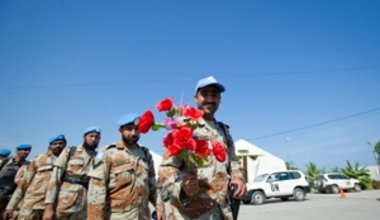2 Aug
2012
Making their voices heard - Timorese election observers with disabilities
Dili, 9 July 2012 - Parliamentary election day in Timor-Leste is a hive of activity. Voters and election observers mingle at the polling stations, each playing an important role in the democratic process.
This year is the first time that Timor-Leste has registered election observers with disabilities. There are 19 of them stationed at polling stations around the country.
Joel Fernandes suffered spinal cord injuries in a car crash six years ago - but he refuses to let being in a wheelchair hold him back. He is an active member of the Disabled Persons Organisation in Timor-Leste, and enthusiastic about taking part in the election as an observer.
"I am happy that my country has given people with disabilities the opportunity to go and observe the electoral process," says Mr. Fernandes. "We are focusing our monitoring on the access issues that people with disabilities face."
Silvia da Costa Soares contracted polio as a child and is another observer in the 2012 elections. Silvia says that living with a disability in Timor-Leste means overcoming challenges - even at the ballot box.
"In the presidential election a few months ago we made some comments about the voting booth," says Ms. Da Costa Soares. "People in a wheelchair can't access the booth because it's too high. We also made a comment about the entrance to some of the polling stations - the doorway is too small, wheelchairs cannot enter."
According to the 2010 census, more than 6 per cent of the Timorese population has disabilities. Many of those have sight impairments. Relatives or friends accompany them to vote - to help mark the cross on the ballot paper.
"I am pleased to be voting today," says Paulina Soares Sequiera, who voted with the assistance of a friend. "Even though I am blind, I also have the same rights as people who are able to see."
Election observers, like Joel Fernandes and Silvia da Costa Soares, ensure that the rights and needs of people with disabilities are not overlooked. The UN commends the work of these observers.
"Who better than people with disabilities themselves, to be actual registered, certified observers," says Louis Gentile, the Head of Human Rights for the UN Integrated Mission in Timor-Leste (UNMIT.) "These observers can make recommendations about improving access to the right to vote and about the entire electoral system. They know better than anyone else what challenges they face and how things can be improved."
The Timorese election observers with disabilities have now worked on three elections – there were two rounds of presidential elections earlier this year. The observers will be compiling their recommendations to ensure that next time Timor-Leste goes to the polls the fundamental right to vote is achievable for all people.
 UN
UN United Nations Peacekeeping
United Nations Peacekeeping



